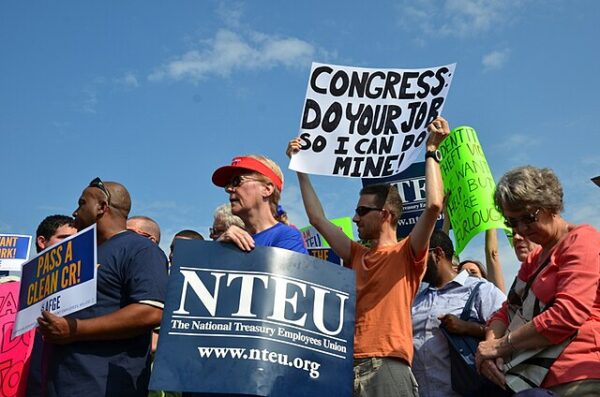The National Treasury Employees Union has filed a legal challenge against one of Donald Trump’s first executive orders, which aims to streamline the process for dismissing career federal employees.
The order signed Monday evening would grant the Trump administration the authority to remove job protections for numerous career federal employees, who are traditionally hired based on merit and protected from arbitrary dismissal. The president claims that blocking his authority over the executive branch through union contracts is unconstitutional.
The New York Times reports:
Mr. Trump issued a similar order in 2020 that aimed to strip federal workers of job protections but it was revoked by former President Joseph R. Biden Jr. Mr. Trump has now brought it back as part of his plan to eradicate what he has derisively labeled “the Deep State.”
The labor union represents about 50,000 federal workers across 37 agencies.
The lawsuit argues that Mr. Trump’s order would “radically reshape the civil service” by drastically increasing the number and type of employees who are at risk of dismissal. It goes on to make the case that reclassifying most federal workers as “at will” employees is contrary to the worker protections Congress has put in place.
Career civil servants include professional staff members across the government who typically retain their jobs when the presidency changes hands. Their roles include law enforcement officers and technical experts at agencies that Congress created to make rules aimed at ensuring the air and water are clean and food, drugs and consumer products are safe.
The lawsuit joins a broader wave of opposition to Trump’s initiatives aimed at overhauling the federal workforce. The same day, additional complaints were filed against the Department of Government Efficiency (DOGE), a program led by billionaire and Trump ally Elon Musk. Critics argue that DOGE’s goal of cutting government spending jeopardizes essential public services, sparking widespread concern among unions and advocacy groups.
In its complaint, NTEU accuses Trump of sidestepping the Administrative Procedure Act (APA) by bypassing the procedural safeguards implemented during the Biden administration. The APA requires federal agencies to follow a detailed process when changing or rescinding regulations, including a mandatory public comment period that often takes months to complete. NTEU highlights that the Biden administration spent eight months crafting new protections for civil servants, which Trump’s executive order appears to disregard, writes Bloomberg.
This isn’t the first legal battle over Schedule F. In 2020, NTEU challenged the initial executive order on similar grounds, but the case was rendered moot when President Joe Biden rescinded the directive shortly after taking office.
The outcome of this legal dispute could have far-reaching implications for the structure and stability of the federal workforce. It may also set a significant precedent for how future administrations navigate civil service reforms and the balance between political influence and worker protections.
[Read More: Republican Congressman Office Lit On Fire]











Fed Govt Unions are Anti Trump vs Pvt sector Unions
per the Constitution, the sole essential federal (the only department authorized by the Constitution) is the Department of Defense
One of the signs reads “Congress do your job, so I can do mine.”
If Congress does its job, his won’t exist.
IIRC one of the very few things FDR got correct was his position that NO federal agency should be unionized.
Under the Constitution – our government is in control by the People not a mob controlled Union. Anyone thinks that they are protected by a Union vs the people needs to be removed immediately.. This why lots of workers are out of a job because of Unions – overpriced and overpaid workers vs the other workers.. Most people such as myself have no use for the mob run Unions.. Then you got the greedy do nothings that wants to draw a big check while running across lines creating problems in the work place trying to get more and more, etc.